Warning: Sensitive Topic, Might Not Be Appropriate For Some Folks
I’ve never bought feed store chicks and it’s only in the last couple of years, when reading the numerous posts in Facebook chicken groups, that I’ve become aware of how many folks rely on feed stores and hatcheries as a source for obtaining chicks.
Inevitably what often ensues is a number of posts from people dismayed that their mail ordered chicks were dead on arrival or asking for advice about their lethargic chicks or querying whether curled toes, crossed beaks, wryneck and splayed legs were to be expected.
Of course, seeing the folks who need assistance might skew my perspective, but months of reading hundreds of posts leave me questioning how chicks are raised and the value we place on them. Perhaps I have the luxury of not having to rely on feed store chicks, so that makes it easier for me to be critical. But it also gives me insight into something I don’t participate in. Most folks are appalled at puppy or kitten mills, but we don’t show the same level of concern about large-scale commercial operations that are essentially chick mills.
Click here to watch a video of a commercial hatchery in action.
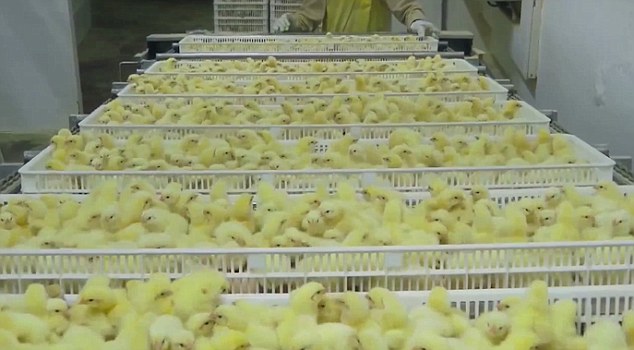
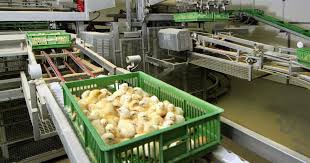
The impetus for this post comes from some of the overwhelm I feel about the casualties of chicken keeping. I wrote a post at the beginning of the Covid 19 lockdown in response to the rush on poultry sales called ‘The Dark Side of Keeping Chickens’. At that time, like so many others, I spent increased time at my computer and on Facebook chicken groups. The enduring theme of sick, injured, dying and dead birds, replete with photo and video documentation, distressed me. I know that all of those things are part of raising birds, but so much of it seems unnecessary and preventable.
This is a further exploration of one aspect of small flock keeping: chicks and what happens to them along the supply chain. I recognize that there are many reputable hatcheries and stores – this is not about them. This is an examination of some of the flaws built into the system, a response to the poor treatment and outright neglect of birds, and a call for higher standards of care for them.
I’m from Canada and the area where I live doesn’t have chain feed stores similar to Tractor Supply (TSC) or Rural King. There are two choices in the small city where I work: one sells point-of-lay pullets and the other sells a limited number of chicks: one breed for sale each week for a short time in the spring. Neither of them sells other live animals.

For my background information on this piece I scrolled through numerous online posts about the topic and also posted my own request asking folks to share their experience buying chicks at feed stores or from hatcheries. I had well over 100 responses, split almost equally between folks who have had good experiences (i.e. healthy chicks) vs those who have had negative experiences.
Even those that ended up with robust birds often found that they didn’t get what they thought they had purchased: the wrong breed or colour, and for many, cockerels from the labelled ‘pullet’ bin. For some, a rooster might be a welcome addition, but others deliberately bought sexed chicks because they didn’t want, or couldn’t have, a rooster.
Big feed stores don’t hatch their own chicks. They purchase them in bulk from commercial hatcheries. That in itself is problematic because chicks need to be shipped. They are fragile and vulnerable to overheating, being chilled or dehydrated, trampled or suffocated. They may be in transit for several days.
If you hatch your own chicks you know that small chicks can’t regulate their body temperatures until fully feathered and therefore need to be be provided with a heat source to ensure their survival. That usually doesn’t happen with shipping.
“My sister works at Rural King. Over the summer they got a shipment of chicks – close to 200 of them were dead on arrival.” – Ashley Foster
I know folks say that newly hatched chicks can survive without food and water for two or three days, but studies have shown the sooner chicks are provided with those necessities the more robust their immune systems are, in both the short and long term.
“The time from hatching to the onset of feeding is a critical period in the development of hatchling chicks. Around 2-5% of hatchlings do not survive this critical post-hatch period because of limited body reserves, and many survivors exhibit stunted growth, inefficient feed utilization, reduced disease resistance or poor meat yield.” (Source)
From reading online comments it’s apparent that weak and disabled chicks are sometimes shipped with healthy chicks. Some of these conditions, such as curled toes or splayed legs that might easily be fixed are made worse by the delays and the conditions those weakened chicks are living in during transport. Since the policy of most feed stores is to not allow customers to touch the birds or hand pick them chicks with health issues are often passed on to unprepared customers. Sure, most suppliers will allow you to bring back ‘defective’ chicks for a refund or replacement, but what do you think happens to those that are returned?
“I quit Atwood’s last year. It was very common for chicks to arrive dead, deformed, with coccidiosis or sick. I buy local after seeing all of that. We had to ‘dispatch’ several with deformed legs.” – Amanda Smith
Sometimes dispatching means humane euthanization, but it can also translate as simply tossing them – live – in the garbage can and waiting for them to die on their own. I read of several online accounts in which shoppers have rescued a number of peeping chicks from the trash bin. Other chicken keepers have formed relationships with their local feed store to adopt the ‘rejects’. Sometimes they get the chicks for free, while others, surprisingly, have to pay for the privilege of trying to nurse sick and injured birds back to health.
“At my TSC I get over 50+ chicks a year that are have deformed legs, really bad pasty butt, or neurological issues; are special needs or blind. I’ve been doing this since 2019 and the survival rate is pretty low, around 20% despite how hard I try to save them. 90% of them were just sick or had pasty butt and I have some with minor problems like curled toes. The ones who survive have a happy life here with me. I really want to know what hatchery they get their chicks from because they need better breeding hens and roosters.” – name withheld
How the hatcheries raise and ship chicks is one issue and then there is how the birds are cared for after their arrival. Training and experience of feed store staff is varied. Some spoke highly of the care and dedication the birds received, while others felt like staff were lacking even basic knowledge of the animals their stores were selling (i.e. chickens, ducks, rabbits).
“I feel like Rural King shouldn’t sell chicks, especially all year long, if they aren’t willing to hire enough employees to properly take care of them. My store hires lazy teenagers who don’t work and don’t care about the chicks’ well-being. You see them hiding in the back or texting on their phones instead of helping customers or taking care of the live animals.” – Rebecca Coffee
“I got my ducks from our local TSC. I asked about ducklings, but was told they no longer had any although we could hear them. We asked an employee about the ducklings and he said that they had four in the back that they didn’t know what to do with because they were too old to sell. I begged to buy all four. I was told they didn’t know if they could sell them to me because they were “too old” – probably 2 weeks old. I told them I didn’t care, I wanted them. What bothered me more was realizing they were in the back room for at least four days, which was the last time I had seen them.” – Crystal Cook
“Whenever I’ve had an issue and call they don’t seem to know what to do other than separate and give chick boost.” – Jen Enoch
My local feed store doesn’t sell chicks, but I know from talking to staff they aren’t chicken keepers and don’t really know much about chicken health issues. I’ve done some educating them about the differences between the various manufactured feed they sell. They just read the guidelines, but don’t really understand what the product is. They didn’t even know that roosters and non-layers shouldn’t eat Layer feed. Chicken feed is a small part of their job and I imagine that’s what it’s like for staff in the stores that sell live birds.
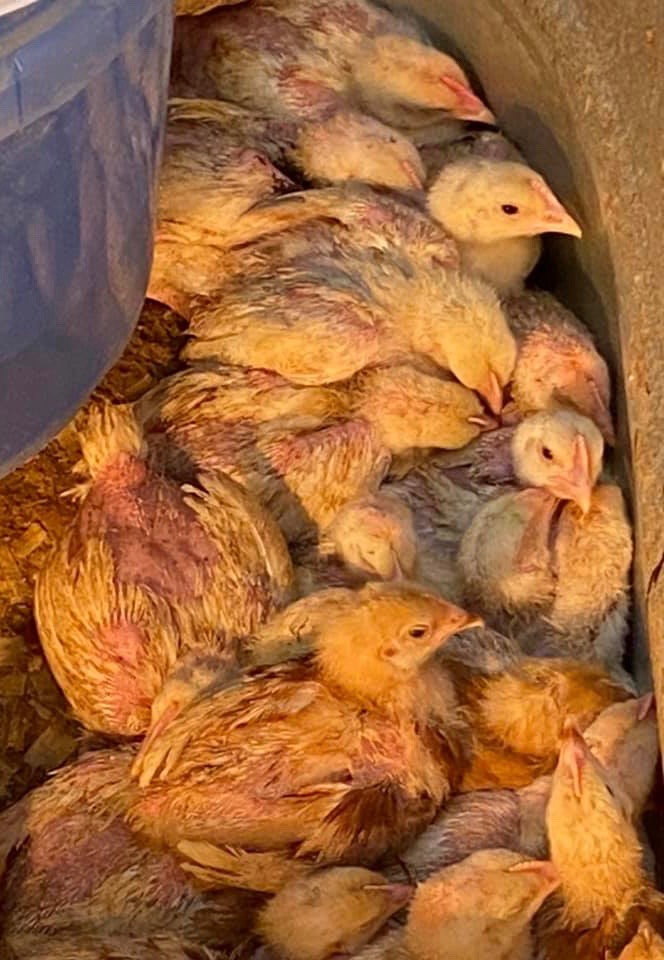
As you can imagine, having to deal with sick and dying chicks can be traumatic, especially for new chicken keepers and folks with kids.
“The sickly bird was nearly dead and less than half the size of the others for the longest time and is still smaller. She kept tilting her head back gasping for air. I had debated culling her, but instead gave her lots of special attention to keep her going. It was very stressful and emotionally hard on me.” – name withheld
“My nine chicks had some illness and the whole set died within 48 hours of bringing them home. No amount of intervention, hand-feeding, or medicine saved a single one.” – Krissy May
“We got 6 from Tractor Supply: the sales kid grabbed some and two were super tiny. Any other time when we’ve gone they let us pick the ones we want. They died an hour after we brought them home. Our daughter was devastated.” – Jenna MacDonald
“So disappointed in Rural King. Half of their chicks were suffering or half dead with pasty butt. They had multiple chicks dead in their brooders just laying there with dried poop covering their entire backside. One was convulsing. I freaked out about it to three different workers until finally someone came back and started gathering the chicks. DO BETTER if you’re going to be responsible for living creatures. I just went there for toilet paper and ended up leaving distraught over the sight of those chicks. I quit shopping there due to the mental distress it causes me seeing their animals suffer” – Rebecca Coffee
I imagine it’s also difficult for committed workers as well. Unfortunately it is often the caring staff that quit out of frustration at their store practices.
“Rural King as a company has let me down for this reason alone: my chickens and rabbits were never taken care of when I wasn’t there. Another sales associate who has no training or any knowledge of chickens whatsoever flat out doesn’t care for the livestock. He has been reported to corporate by customers time after time and has not been fired. On top of that, the overnight crew seems to think the chickens don’t need to be fed. I’ve weighed the feed bucket the night at closing, had a day off and when I came back for a shift the bucket would still be the exact same weight down to the last gram. That’s not fair to me, our customers or to the livestock. I find dead chickens underneath the feeders because someone is too lazy to throw them away, so they just keep the dead ones in there with the live ones until I get back. On average when I return from a day off I find 150 dead chicks when I open because the tanks are way overcrowded and the chickens are on top of each other. This is not how you treat live animals.” – T.G.
As I mentioned at the outset, the care of birds seems to be inconsistent, often dependent on the training of staff and the priorities of management whether they value their livestock or not.

So what do I suggest folks who are looking to buy shipped or feed store birds?
- I see lots of posts in Facebook chicken groups in which people have bought chicks on impulse (e.g. I went in to the store for garden supplies and came out with a box of chicks). It’s important that you’ve done your research and are fully prepared.
- My recommendation is to buy local where chicks were born on site and haven’t endured the stresses of transport. You can talk to the breeder and perhaps visit the farm so you can see if the flock is healthy and their housing appears clean.
- If you buy from a feed store: take a good look at the chicks. Do they have clean water and enough feed? Are they robust and running around or huddled in the corner? Are they overcrowded? Do you see pasty butt, which is a symptom of stress and overheating?
- Beware: if you purchase sick birds you may be putting your other birds at risk. Practice good biosecurity and quarantine the new members until they have a clean bill of health.
- How knowledgeable is the staff? If they aren’t aware of basic chick care they may contribute to issues like pasty butt or not fix easily remedied conditions like curled toes.
- If you order shipped chicks realize they are easily stressed which has a negative impact on their immune systems. Find out how long the delivery will take. Will chicks be packed with a heat source in cold weather? Are shipping crates well ventilated in hot weather? How many birds will be placed in each transport box? How reliable is your postal or courier service? The pandemic has severely hampered shipping – now might not be the best time to order from hatcheries which can’t guarantee arrival times. Chicks deprived of food and water may also have negative health impacts.

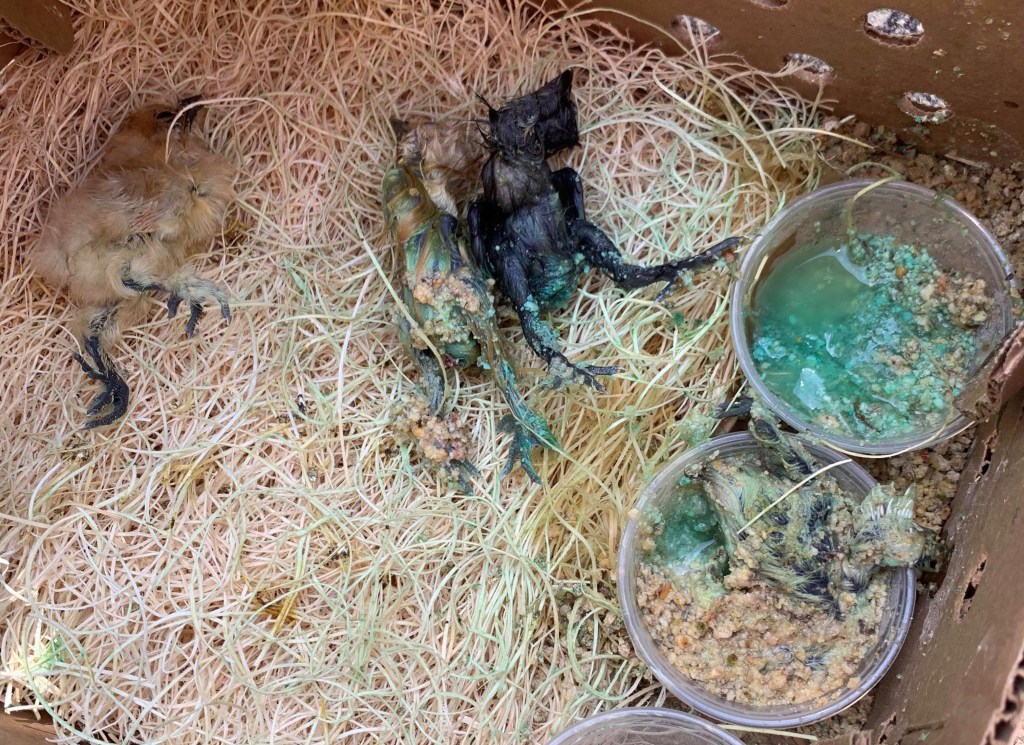
“All 4 arrived dead. The hatchery blamed postal series and the postal service blamed the hatchery (for shipping with open water containers). It was very heartbreaking for us and my children. I’ve advocated for people to stop buying chicks through the mail.” – Tara Smith
” I ordered chicks from a hatchery in January for a March hatch date; as the date drew near, I contacted the hatchery because our post in Michigan had been struggling. They assured me multiple times, over three days, that the birds would be fine. They took six days to get to my local post office after being shipped, all were DOA. I tried so hard to get them to stop sending birds, as mine was one of four orders from three hatcheries in which all birds were DOA. I had 36 chicks, one order had over 300. A lot of lives lost.” – Amanda Stewart
- Many suppliers will offer a refund or replacement for dead chicks. Yes, you’re not out-of-pocket, but what does that say about the value of those birds that they are so expendable? For every bird that survives to live a happy life how many birds have suffered or died to supply our need for chickens?
- If you see neglect or issues at your feed store, then make a complaint – to both that store’s management as well as to head office. Pressure them to improve hatchery stock, care for the chicks and support and training for their staff.
“I’ve called corporate on my local Rural King multiple times over their poor care of chicks. All they did was send an email to my local store. I’ve left messages at the store and no one responds” – Rebecca Coffee
Understand that for some businesses the value of livestock is directly tied to how much money they can be sold for. When chicks are priced for as little as $.25 there is no profit margin and often no incentive to treat them as valuable. They are easily replaced by one of many chicks being bred at large-scale hatcheries. The phrase ‘you get what you paid for’ comes to mind.
We all love a deal, but in some cases our desire to buy chicks cheaply is to their detriment. From the time they are born at commercial hatcheries until the time they reach their new homes chicks endure a variety of stressors, and many are distressed or die along the way. If their suffering is normalized as part of the cost of doing ‘business’ and the accepted sad downside for backyard chickens is neglect, there is something wrong with the way we are doing things.
TSC and Rural King both got the most positive comments and the most complaints, which is not surprising given that they are the largest and most widespread feed stores. To be fair, small hatcheries, breeders and other stores also drew both praise and criticism. This isn’t about criticizing particular operations, rather it’s an attempt to hold those suppliers to account.
I know there will be some pushback to this post – I have already experienced it when I asked for online feedback. I don’t feel I have to present a ‘balanced’ picture or praise feed stores for having healthy chicks – that is their job and to be expected. My intention is to shine a spotlight on the flaws built into the system of producing and marketing chickens, and to speak for the vulnerable in order to improve their care. We all have some economic power, however small, every time we buy something. Be conscious of what your dollars are contributing to and push for better animal welfare conditions for the birds we all love so much.
“I hate how they have such a high rate of death and they’re just like oh well, here’s new ones, rather than fixing the problem of why so many are dying, as if the little chicks’ lives are just a thing and not a living thing.” – Noel Graff
Update April 2021
In 2021, Tractor Supply (TSC) changed its brooding system and began using battery cage-style brooders, which replaced stock troughs. This move was implemented to reduce operating costs, minimize labor costs and increase available retail floor space, but has left many of their ducklings and chicks cold, suffering or dead. The heating system is inadequate and the floor surface causes foot and leg issues. Many customers are reporting high mortality rates once the chicks are home.
A petition has garnered over 60,000 signatures. Some TSC stores have gone back to the trough style brooders, but many still have not.
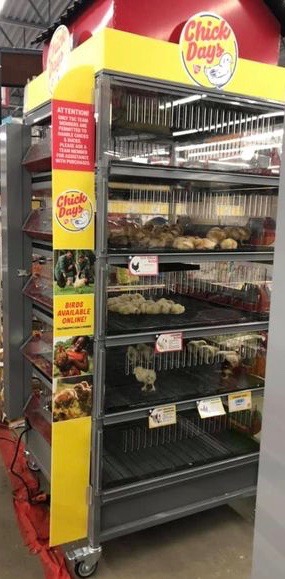

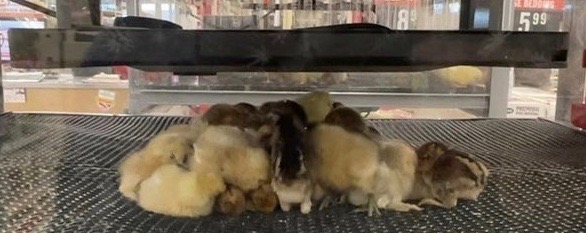

“I know I’m a little out of the loop because our nearest Tractor Supply is an hour away; but I’ve recently visited mine and they changed the layout for the chickens. They all are in one stand alone container but it’s really tall with different sections for the different breeds. There is a flat heater on the ceiling of each level and the sides are plexiglass with holes. One side has a small feeder lining the edge of each level.
They have signs lining the area saying things like “We care about our chicks.” “We are doing it this way now so it’s cleaner and easier” “There’s no more heat lamps” “We have a chick captain for each shift.” One level of chicks was completely out of food, so I filled it up for them, staring directly at a worker the entire time.
It is so sad. If I could work there, I would be obsessed with being the chick captain. I would make sure I keep an eye on them. I hope this new setup works for them, but I already have decided it’s not.” – Bethany Lake

Featured Photo Credit: San Antonio Express News

I haven’t really thought about the comparison to puppy mills. But that is so true. We did order our chicks from a reputable hatchery. Thanks for the post though because it made me realize how careful we need to be!
patiencengraceco.wordpress.com
LikeLiked by 2 people
Very well said.
I’ve already had it firmly in my mind to start off with pullets, so I admit, I hadn’t given much thought to what the chicks go through apart from shipping – which seems outrageous to me.
The video was extremely eye opening for me. I hope this post helps others make informed choices. When we know better, we can DO better!
LikeLiked by 1 person